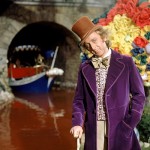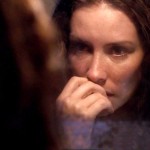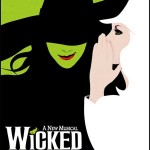 Whereas “Lighthouse” was all about our enlightenment, “Sundown” explored our dark side—temptation. “I can see her lying back in her satin dress in a room where you do what you don’t confess,” sang Gordon Lightfoot in his 1974 hit “Sundown.” The song is all about succumbing to temptation, hence once again revealing the double entendre that the Lost writers are so fond of using in their episode titles. When the sun goes down, man gets tempted by the dark. Why a “satin” dress? Sounds like Satan, don’t it?
Whereas “Lighthouse” was all about our enlightenment, “Sundown” explored our dark side—temptation. “I can see her lying back in her satin dress in a room where you do what you don’t confess,” sang Gordon Lightfoot in his 1974 hit “Sundown.” The song is all about succumbing to temptation, hence once again revealing the double entendre that the Lost writers are so fond of using in their episode titles. When the sun goes down, man gets tempted by the dark. Why a “satin” dress? Sounds like Satan, don’t it?
 Lost episode 6.4, “The Substitute,” has so many parallels with Willy Wonka and the Chocolate Factory , I am convinced that the movie can be used to reveal Lost’s endgame. While I’m sure those parallels also exist within the actual Charlie and the Chocolate Factory book, since I am more familiar with the 1971 Gene Wilder movie (having seen it dozens of times), I will make my comparisons there. Sure, this may turn out to be nothing more than stuff and nonsense, but in the words of Wonka, “a little nonsense now and then is relished by the wisest men.” So, let’s get to it because we have so much time and so little to do. Strike that…reverse it.
Lost episode 6.4, “The Substitute,” has so many parallels with Willy Wonka and the Chocolate Factory , I am convinced that the movie can be used to reveal Lost’s endgame. While I’m sure those parallels also exist within the actual Charlie and the Chocolate Factory book, since I am more familiar with the 1971 Gene Wilder movie (having seen it dozens of times), I will make my comparisons there. Sure, this may turn out to be nothing more than stuff and nonsense, but in the words of Wonka, “a little nonsense now and then is relished by the wisest men.” So, let’s get to it because we have so much time and so little to do. Strike that…reverse it.
 Have you ever met someone for the first time who seemed really familiar to you? Strangely, this person likely wound up being an important player in your life. This exact scenario happens to Jack in LA X when he recognizes Desmond on the plane. In What Kate Does, Kate’s parallel life is once again setting up the scene for her to have a connection with Claire and baby Aaron. What if the reason for this familiarity is because we are recognizing these people from our future, or from the story of our destiny?
Have you ever met someone for the first time who seemed really familiar to you? Strangely, this person likely wound up being an important player in your life. This exact scenario happens to Jack in LA X when he recognizes Desmond on the plane. In What Kate Does, Kate’s parallel life is once again setting up the scene for her to have a connection with Claire and baby Aaron. What if the reason for this familiarity is because we are recognizing these people from our future, or from the story of our destiny?
 As soon as I learned of the title of Lost’s Season 6 premiere episode last year, I immediately began to wonder about its implications. Sure, the LA X was a reference to LAX, the abbreviation for Los Angeles International Airport where Oceanic Flight 815 was suppose to land, but why was there a space between the “LA” and the “X”? Like everything on Lost, surely this play on letters was for a reason.
As soon as I learned of the title of Lost’s Season 6 premiere episode last year, I immediately began to wonder about its implications. Sure, the LA X was a reference to LAX, the abbreviation for Los Angeles International Airport where Oceanic Flight 815 was suppose to land, but why was there a space between the “LA” and the “X”? Like everything on Lost, surely this play on letters was for a reason.
 I just watched what is quite possibly the most brilliant and hysterically funny movie review I’ve ever seen. This masterpiece critique was created by Mike of Red Letter Media and consists of seven parts that can all be viewed on YouTube. I highly recommend everyone viewing at least the first two parts of his videos, but it will not be necessary to understand what I’m about to say. His analysis brought to the forefront something that I’ve pushed down deep into my psyche for over ten years and am only now ready to release: The Phantom Menace is not only the biggest disappointment in movie history, it is also very likely completely responsible for screwing up our world’s history. Yes, I’m completely serious. Before I begin proving my point, let me begin with some facts that will be a little easier to swallow.
I just watched what is quite possibly the most brilliant and hysterically funny movie review I’ve ever seen. This masterpiece critique was created by Mike of Red Letter Media and consists of seven parts that can all be viewed on YouTube. I highly recommend everyone viewing at least the first two parts of his videos, but it will not be necessary to understand what I’m about to say. His analysis brought to the forefront something that I’ve pushed down deep into my psyche for over ten years and am only now ready to release: The Phantom Menace is not only the biggest disappointment in movie history, it is also very likely completely responsible for screwing up our world’s history. Yes, I’m completely serious. Before I begin proving my point, let me begin with some facts that will be a little easier to swallow.
 When I think about the TV shows and movies I used to watch as a kid, it was always very easy to tell who was good and who was bad. Superman—good. Lex Luthor—bad. Mike Brady—good. The dude who faked whiplash to win a case against Carol—bad. The Scooby gang—good. The masked villains who would’ve gotten away with their dastardly schemes had it not been for those blasted kids—bad. Looking back at it now, I honestly think this black and white view of the world tainted my perception of people and experiences. Teachers and kids were either good or bad. A hot lunch choice was either good or bad. My day was either good or bad. And because I grew up thinking this way, much of this mindset is still with me, for better or for worse.
When I think about the TV shows and movies I used to watch as a kid, it was always very easy to tell who was good and who was bad. Superman—good. Lex Luthor—bad. Mike Brady—good. The dude who faked whiplash to win a case against Carol—bad. The Scooby gang—good. The masked villains who would’ve gotten away with their dastardly schemes had it not been for those blasted kids—bad. Looking back at it now, I honestly think this black and white view of the world tainted my perception of people and experiences. Teachers and kids were either good or bad. A hot lunch choice was either good or bad. My day was either good or bad. And because I grew up thinking this way, much of this mindset is still with me, for better or for worse.
 Continuing in the same vein as Part 1, Parts 2&3 was mostly action/adventure and little mythology. And what little there was still seems to support my theory.
Continuing in the same vein as Part 1, Parts 2&3 was mostly action/adventure and little mythology. And what little there was still seems to support my theory.
For starters, at the end of the last episode’s update, I wrote:
In “Something Nice Back Home” Hurley even suggests that none of them made it off the island, and they were, perhaps dead. Not dead, just stuck in limbo between worlds. I feel like the season will end with the five of them not being rescued as we think, but getting hurt, and this whole flash-forward has all been in their minds.
 The episode begins within the flashback of “Other” woman Juliet where she meets fellow Other, Harper Stanhope. We learn that Harper is a psychologist to the Others and married to Goodwin, who Juliet later has an affair with, making her the other woman from Harper’s perspective. Of course, the other woman may also be Harper herself from Juliet’s perspective. Either way, the fact that Harper is a psychologist definitely fits in with The Myth of Lost simulation theory because of one of its major points: that many of the Others are providing therapy to the Losties. If this were true, just as in our world, therapists see their own therapists regularly. So, having a resident shrink on the island is a big boost to the simulation theory.
The episode begins within the flashback of “Other” woman Juliet where she meets fellow Other, Harper Stanhope. We learn that Harper is a psychologist to the Others and married to Goodwin, who Juliet later has an affair with, making her the other woman from Harper’s perspective. Of course, the other woman may also be Harper herself from Juliet’s perspective. Either way, the fact that Harper is a psychologist definitely fits in with The Myth of Lost simulation theory because of one of its major points: that many of the Others are providing therapy to the Losties. If this were true, just as in our world, therapists see their own therapists regularly. So, having a resident shrink on the island is a big boost to the simulation theory.
 Whereas “Lighthouse” was all about our enlightenment, “Sundown” explored our dark side—temptation. “I can see her lying back in her satin dress in a room where you do what you don’t confess,” sang Gordon Lightfoot in his 1974 hit “Sundown.” The song is all about succumbing to temptation, hence once again revealing the double entendre that the Lost writers are so fond of using in their episode titles. When the sun goes down, man gets tempted by the dark. Why a “satin” dress? Sounds like Satan, don’t it?
Whereas “Lighthouse” was all about our enlightenment, “Sundown” explored our dark side—temptation. “I can see her lying back in her satin dress in a room where you do what you don’t confess,” sang Gordon Lightfoot in his 1974 hit “Sundown.” The song is all about succumbing to temptation, hence once again revealing the double entendre that the Lost writers are so fond of using in their episode titles. When the sun goes down, man gets tempted by the dark. Why a “satin” dress? Sounds like Satan, don’t it?



 When I think about the TV shows and movies I used to watch as a kid, it was always very easy to tell who was good and who was bad. Superman—good. Lex Luthor—bad. Mike Brady—good. The dude who faked whiplash to win a case against Carol—bad. The Scooby gang—good. The masked villains who would’ve gotten away with their dastardly schemes had it not been for those blasted kids—bad. Looking back at it now, I honestly think this black and white view of the world tainted my perception of people and experiences. Teachers and kids were either good or bad. A hot lunch choice was either good or bad. My day was either good or bad. And because I grew up thinking this way, much of this mindset is still with me, for better or for worse.
When I think about the TV shows and movies I used to watch as a kid, it was always very easy to tell who was good and who was bad. Superman—good. Lex Luthor—bad. Mike Brady—good. The dude who faked whiplash to win a case against Carol—bad. The Scooby gang—good. The masked villains who would’ve gotten away with their dastardly schemes had it not been for those blasted kids—bad. Looking back at it now, I honestly think this black and white view of the world tainted my perception of people and experiences. Teachers and kids were either good or bad. A hot lunch choice was either good or bad. My day was either good or bad. And because I grew up thinking this way, much of this mindset is still with me, for better or for worse.


